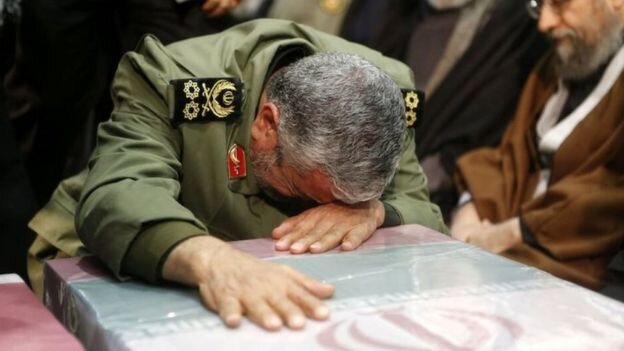Some reactions to Soleimani’s assassination
More reasons for American troops to feel welcome and safe?

The assassination of revered General Qassem Soleimani this Friday can be considered at best as shot first and make excuses later, a typical of American cowboy posture. It is hard to place confidence in U.S. President Donald Trump, who lies almost daily about matters large and small. His short-sighted nature on decisions regarding national security (including call off strikes against Iran 10 minutes before impact, invite the Taliban to Camp David and abandoning the Kurds, buddying up with Kim Jung-un, are to name a few).
Soleimani, 62, headed Iran's elite Quds Force, and was tasked with protecting and boosting Iran's influence in the Middle East.
The escalatory cycle began in May 2018, when Trump recklessly ignored the advice of his national security team and the opposition of allies in unilaterally withdrawing from the Iran nuclear deal – despite Iran’s full adherence to its terms and its efficacy in rolling back Iran nuclear program.
Trump’s “Maximum Pressure” campaign has made life hard for the general population, soaring the cost of living due to which we saw protests scattered all over the country recently.
However, the assassination of General Soleimani has once again united the country and even bought sympathies from the Iraqi nation which was evident from the hundreds of thousands of mourners in his funeral in several Iraqi cities.
Monday’s procession was held in Tehran and General Soleimani will be finally laid to rest in his hometown of Kerman.
UPDATE OF EVENTS:
- Two days after the assassination of General Soleimani, Iraqi parliament voted to ask the U.S. government to end an agreement to host 5,200 U.S. troops still stationed in Iraq. The move would oust all foreign boots from Iraqi soil. Trump has threatened sanctions. Iran's foreign ministry has maintained that the new U.S. sanctions are a sign of its bullying approach.
German Foreign Minister Heiko Mass expressed his concerns over the increasing tensions in the Middle East, but also reiterated that the Iraqi government’s position must be respected.
The move is non-binding, but it is likely to be heeded by the Prime Minister Abdul-Mahdi who slammed U.S. attack and informed parliament that Soleimani was due to meet with him the day he was killed and deliver a response from the Iranians to a Saudi message that could have led to a de-escalation of tensions, reports Reuters.
- Iraq Parliament Speaker, Mohammed al-Halbousi, denounces U.S. strike as “breach of Iraqi sovereignty”.
- The popular Iraqi Shi’ite cleric Moqtada al-Sadar, who heads the largest bloc in Iraqi parliament, has called for more substantial response to the killing. He called the Iraqi parliament bill “a weak response, insufficient against American violation of Iraqi sovereignty and regional escalation.”
- Iraqi officials have summoned the U.S. envoy to Iraq, Mathew Tueller, over the strikes.
- Iraq’s National Security Council denounced the U.S. assassination late on Friday.
- Last Sunday, three blasts appeared to be mortars or rockets that landed inside the heavily fortified Geen Zone, home of the U.S. Embassy and a number of other foreign embassy. No casualties were reported.
- The U.S. has failed to deter Tehran thus far, even with the deployment of 14,000 additional American troops in the Persian Gulf region since May. The announcement this week that the Pentagon was sending 3,500 more soldiers from the 82nd Airborne Division seems unlikely to change things.
- Britain warns nationals against travel to Iraq and Iran.
- Iran announced Monday on State TV it will further roll back its commitments to a landmark 2015 nuclear deal and no longer observe limitations on its capacity for enrichment, the level of enrichment, the stock of enrichment material, or research and development.
Tehran says it can reverse course and undo breaches of nuclear agreement if U.S. economic sanctions are lifted. In the meantime, Tehran will continue to cooperate with the UN nuclear watchdog, the country said.
Last year on the 40th anniversary of the U.S. Embassy take over in a televised speech Ali Akbar Salihi, head of Iran Atomic Energy Organization said: “Today, we are witnessing the launch of the array of 30 IR-6 centrifuges.” This brought the number IR-6 centrifuges to 60. The centrifuges will allow Iran to produced enriched uranium 10 times faster than the first general models.
- A statement from the Elysee Palace on Monday sent out a plea for de-escalation as the European Union seeks to give a cohesive response. In a joint statement from France, Germany and UK: “There is now an urgent need for de-escalation. We call on all parties to exercise utmost restraint and responsibility. The current cycle of violence in Iraq must be stopped”, reported euronews.
Caption: Iran's supreme leader wept as he led prayers for Qasem Soleimani, as huge crowds gathered in Tehran.
Caption 2: Among those there was Esmail Ghaani, the new head of Quds. (Reuters)
